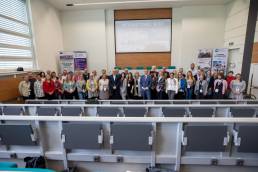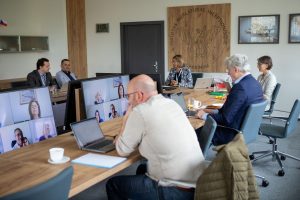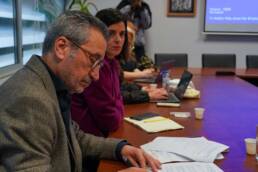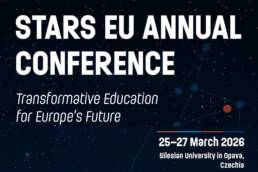On April 24 – 23, 2023, the School of Business Administration of the Silesian University in Opava (SU SBA), Czechia, played host to an exceptional event: the first edition of the STARS EU Staff Week. Held in conjunction with the International Week event of the SU SBA, the Staff Week brought together professionals from nine higher education institutions associated with the STARS EU Alliance. The event aimed to foster collaboration, share best practices, and establish new connections among engaged universities. With over 70 participants from 14 different countries and 20 foreign universities, the event was a resounding success.
Opening day
The opening ceremony commenced with a warm welcome from Tomáš Gongol, the newly appointed Rector of Silesian University. He highlighted the significance of the STARS EU Alliance as a strategic focus for the university and expressed his delight in hosting the event. Roman Šperka, the Dean of the School of Business Administration, followed with an informative presentation on the university and its hosting School. Jana Šimáková, the Vice-Dean for International Relations, extended a warm welcome on behalf of the organizing team, wishing all participants a productive and rewarding week in Karviná.
Rima Dijkstra, the alliance leader from Hanze University of Applied Sciences, Netherlands, shared an insightful overview of the STARS EU Alliance. Rima highlighted the alliance’s focus on addressing common societal challenges and themes such as demographic change, future competencies, industrial transition, and sustainability. The presentation also introduced the alliance’s cooperation structures, joint projects, and ambitious plans for the future, including e.g. the establishment of a “Technology Transfer Office” or “Future Lab”.
Daniel Stavárek, the Vice-Rector for Science and International Relations at Silesian University, delivered an informative presentation on the European Universities Initiative. He discussed the benefits of EU Alliances, the challenges associated with funding and governance, and emphasized the need for coordinated efforts and improved financial support for alliance activities.
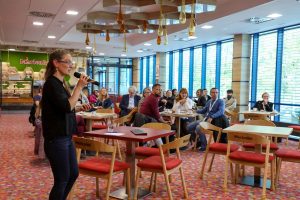 One of the highlights of the day was an interactive world café session facilitated by Rima Dijkstra. This session encouraged participants to engage in lively discussions. The characteristics of a European University and ways to contribute to its establishment were explored. Ideas for increased student mobility, harmonized quality management systems, and more opportunities for lifelong learners were among some other topics discussed. The session sparked creative thinking and fostered a sense of shared STARS EU vision among all the participants.
One of the highlights of the day was an interactive world café session facilitated by Rima Dijkstra. This session encouraged participants to engage in lively discussions. The characteristics of a European University and ways to contribute to its establishment were explored. Ideas for increased student mobility, harmonized quality management systems, and more opportunities for lifelong learners were among some other topics discussed. The session sparked creative thinking and fostered a sense of shared STARS EU vision among all the participants.
Following up on the word café, Niels Hexspoor from Palacký University in Olomouc, a member of the Aurora Alliance, shared his experience and insights. Aurora, established in 2016, is a consortium of 10 research-intensive universities dedicated to social impact and community engagement. Niels emphasized the importance of proper organization, student engagement, and building strong relationships within the alliance. He advised setting realistic targets, not forgetting to involve IT staff and always thinking of backup plans. He also stressed the need for a dedicated team who can work for the alliance full-time to ensure successful completion of tasks and reminded participants that the alliance is a long-term commitment, not just a project with an end date.
During the STARS EU Staff Week, 5 working groups met to discuss important topics and explore opportunities for collaboration within the STARS EU Alliance. All working group meetings, including the Steering Committee meeting, were organised in a hybrid format, i.e. with the possibility to connect online via MS Teams.
The STARS EU officers group focused on integrating the alliance into member organizations, emphasizing the need for regular meetings and better internal communication. They also agreed to connect with the Communication managers group to explore joint activities.
The Strategy advisers group delved into strategy development, highlighting the significance of internationalization and European values. They shared concrete ideas on involving more colleagues in the alliance and emphasized the importance of top management support. Joint research projects, student and staff mobility, and utilizing platforms like BIPs were identified as key areas for success. Engaging students through podcasts, interviews, and social media was also suggested.
The E-learning experts group compared information and e-learning systems used by alliance members, acknowledging both similarities and differences in support structures and resources. They discussed the possibility of creating a shared platform for accessing courses based on different students’ identities and would like to focus on the concept of a virtual campus in the following discussions.
The Erasmus without paper group, comprising mostly international relations officers, focused on student and staff mobilities. They discussed the sharing of study courses and programs within the alliance and examined each university’s mobility system. The functionality of platforms varied among institutions, leading also to discussions on centralized and decentralized approaches to inter-institutional agreements.
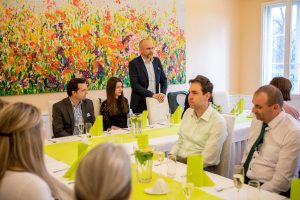 Other speakers and cultural program
Other speakers and cultural program
The event was enriched by the valuable contributions of other speakers. Diederich Bakker from Hanze University of Applied Sciences shared his expertise in teaching abroad and working with students from diverse cultures. How does cooperation between universities and innovation agencies help support entrepreneurship in regions undergoing transition? Adéla Píchová from the Moravian-Silesian Innovation Centre came to talk about this topic.
The event also featured an engaging social and cultural program. Participants enjoyed a visit to Marlenka cake factory in Frýdek-Místek, explored the Leaning Church of St. Peter of Alcantara, took a tour of Karviná, and even had the opportunity play golf. The memorable gala dinner was held at Petrovice Chateau nearby Karviná.
For a detailed programme, photo gallery, reports and more information about the event please visit go.slu.cz/intweek.
We look forward to meeting again for the next STARS EU Staff Week planned for 20-24 November 2023 in Bremen, Germany!
Related Posts
February 6, 2026
Celebrate the International Day of Women and Girls in Science with STARS EU
The alliance demonstrates its commitment to full and inclusive participation of…
February 3, 2026
Bragança Polytechnic University and University West strengthen their strategic cooperation in research and doctoral training within STARS EU
The meeting addressed the implementation of joint doctorates and the connection…
January 30, 2026
Education to address new challenges, focus of the third STARS EU Annual Conference
The next event will take place in March 2026 at the Silesian University in…

